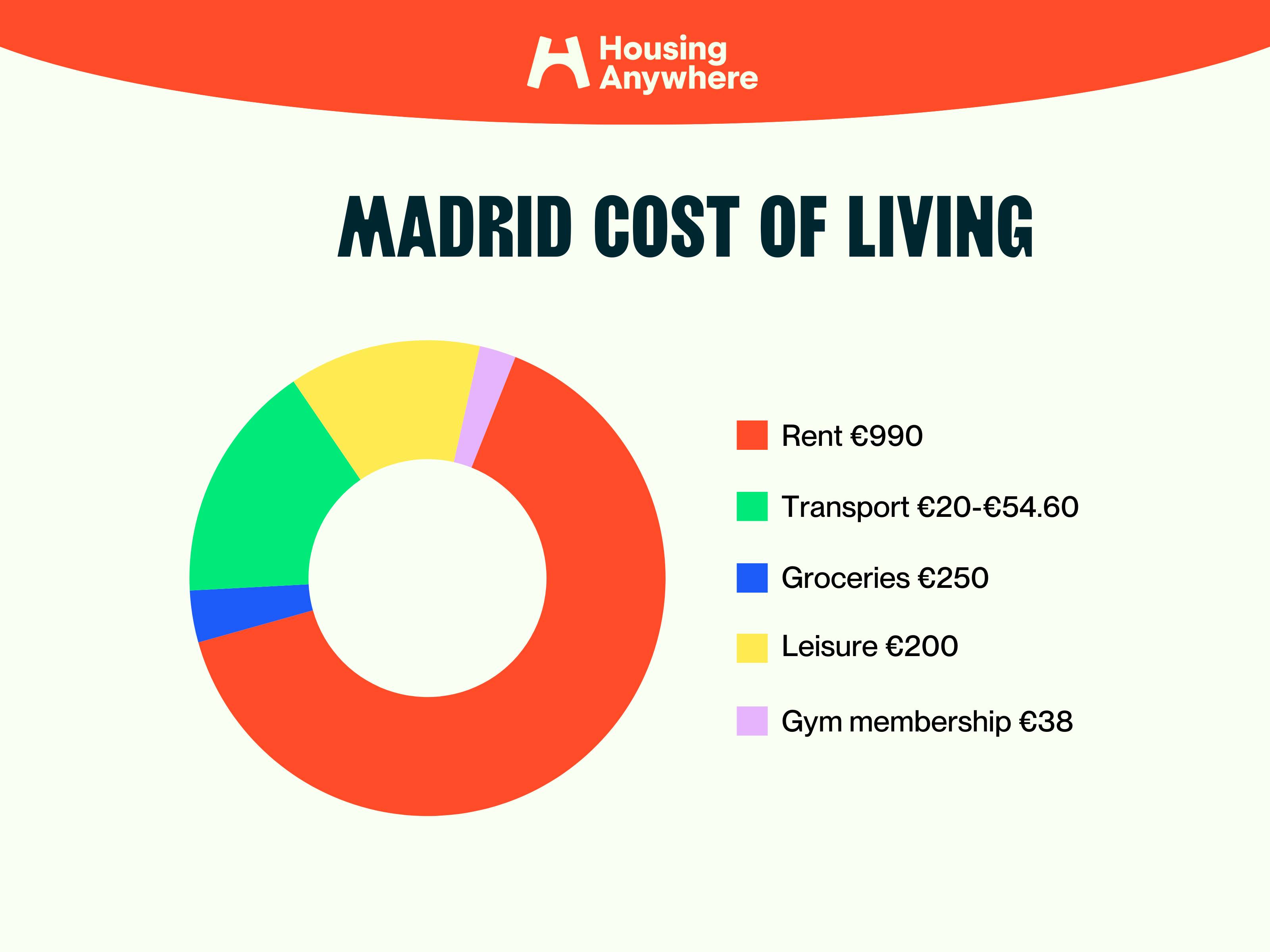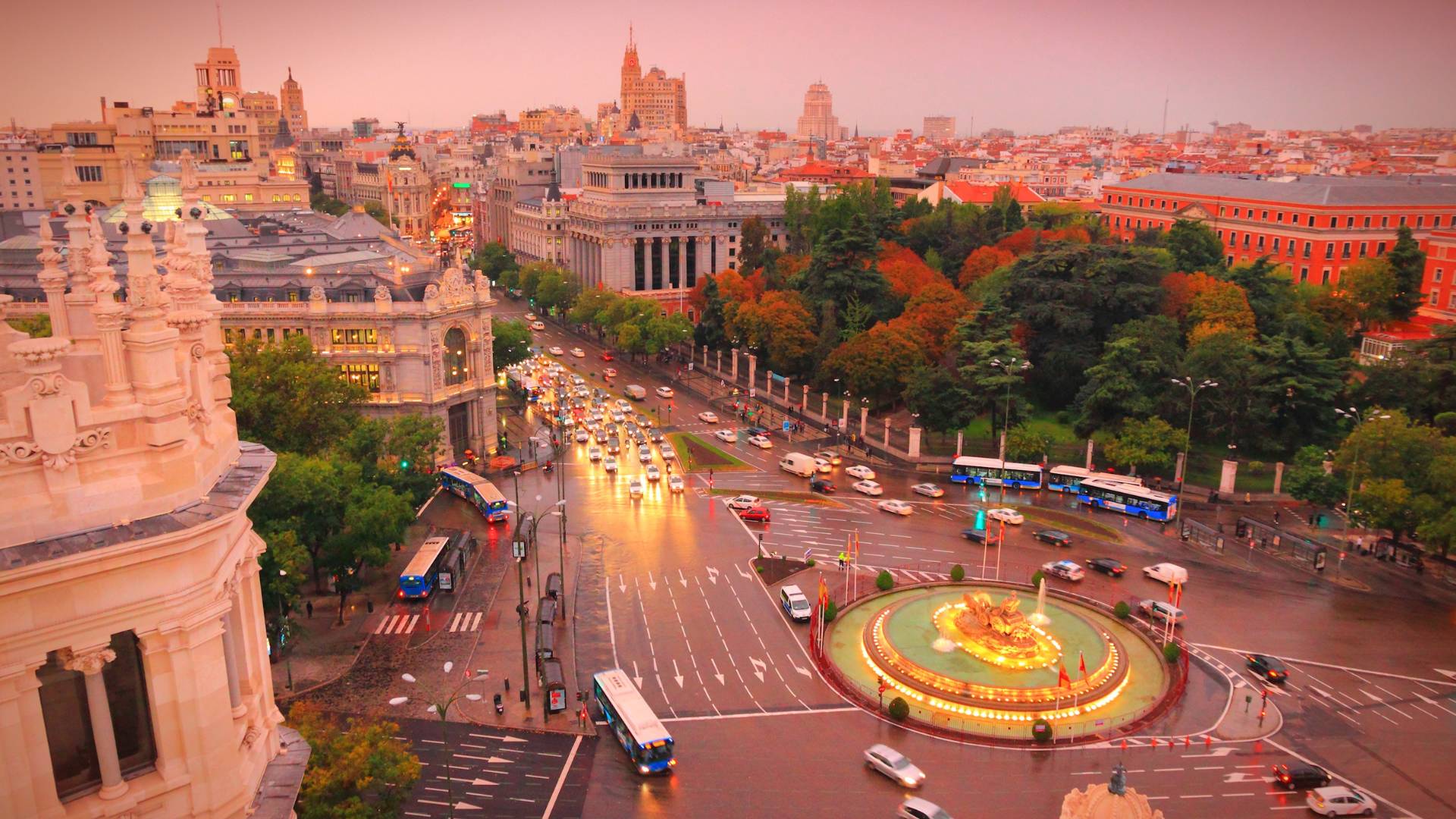The ultimate Guide to the Cost of Living in Madrid
Have you decided to move to Madrid, the 10th best city globally? Plan your budget by finding out the cost of rent, transport, groceries, and more.
Jale
Madrid offers everything for students and young expats; From being warm and sunny all year round to having excellent public transport, high-quality education and endless job opportunities. It's one of the best cities to live in Spain.
In fact, the capital of Spain ranks 4th among the best urban cities and 13th as the best place to live in the world.
If you’re moving to this wonderful city to work or study, the best way to prepare is to create a budget by finding out how much it costs to live in Madrid.
To help you out, we’ve broken down the cost of living in Madrid into 4 essential categories:
- Housing
- Grocery
- Leisure activities
- Transportation
What is the cost of living in Madrid?

Although the cost of living in Madrid is expensive compared to other Spanish cities like Seville and Valencia, it’s still more affordable than other European capitals like Paris or Amsterdam. Without the rent, your monthly expenses will be €745 on average. For the accommodation, expect to pay on average €625 to €1,695 monthly. So with a total of €1,767, you can afford to live in Madrid.
The average rent in Madrid

Here’s an indication of the average monthly rent in Madrid based on our rent index 2025.
- Private Room (best for students): 625.
- Studio (best for singles, couples, or new graduates): €1,199.
- Apartment (best for couples or families): €1,695.
The accommodation hunt in Madrid is fierce: it’s especially competitive at the end of the summer and the beginning of autumn because of incoming students. The high demand also makes the prices go up. So the best advice we can give you would be to start your housing search as early as May.
But be cautious! Because the demand is high, there’re many scams in the real estate market. To avoid rental scams in Madrid, use a trusted service.
Cost of groceries in Madrid
Marid has many options for your wallet. If you want to save money while buying high-quality products Mercado de la Cebada food market is a gem. It’s located in the La Latina street and is open every day except Sundays. Go early in the morning to beat the crowd and avoid buying fish on Mondays since it’ll likely be from last Friday.
There’re also discount stores, such as Mercadona or Lidl, and supermarket chains, such as Carrefour or El Corte Ingles.
Below you’ll find average prices for common food products in Madrid:
| Food | Average Cost |
|---|---|
| Milk (1 l) | €1.05 |
| Fresh white bread (500 g) | €1.25 |
| Rice (1 kg) | €1.65 |
| Eggs (12) | €3.25 |
| Chicken fillet (1 kg) | €7.70 |
| Bananas (1 kg) | €2.03 |
| Apples (1 kg) | €2.20 |
| Onions (1 kg) | €1.92 |
| Tomatoes (1 kg) | €2.45 |
| Potatoes (1 kg) | €1.78 |
Cost of leisure activities

Madrid has a wide range of entertainment and leisure activities. Whether you want to see Picasso’s Guernica painting in the Reina Sofia museum while enjoying a chocolate churro or enjoy a nice dinner at Four Seasons Hotel Madrid by famous Chef Dani García’, it’s always best to budget well so you won’t empty your bank account.
Restaurants:
| Type | Average Cost |
|---|---|
| A meal in an inexpensive restaurant | €15 |
| Three course meal for two in a middle-class restaurant | €60 |
| Cappuccino | €2.60 |
| Domestic Beer (0.5l) | €3.50 |
| Imported Beer (0.5l) | €4.50 |
| Bottle of wine in a restaurant | €15-€20 |
Leisure time and personal care:
| Type | Average Cost |
|---|---|
| Cinema ticket | €10 |
| Monthly gym membership | €45 |
| Museum ticket | €7-€15 |
Transportation costs in Madrid

Public transport: Madrid has an extensive and affordable public transport system. While the cheapest option is a bus (€1.50 for a single-way ticket), the most convenient option is the metro. You can buy a single ticket for €1.50-€2. If you know you’ll be using public transport extensively, you can buy a 10-trip ticket pack for €7.30-€10.90.
Alternatively, you can purchase a monthly subscription for both bus and metro. If you're a student under 26, you'll pay €20 monthly for the Abono Joven subscription. This allows you to travel all of the zones freely. If you're 26 or older, you'll pay for standard monthly subscription. According to the CRTM, the base price for 30-day multiple zone ticket starts at €28.70.
Madrid also has commuter trains called Cercanías to connect the whole city. It has a different tariff than the metro and bus. Students studying in the Madrid region (students of Autonomous University of Cantoblanco, University Carlos III of Madrid, University Rey Juan Carlos and University of Alcalá de Henares) can opt for 3-months student subscription which allows them to use Cercanías on chosen routes.
Taxis: In Madrid, tariffs for taxis change depending on time and day. From Monday to Saturday, from 6 a.m. – 9 p.m., the base fare is €2.50 and then €1.10 per km. But the base fare for Sundays and any other day from 9 p.m. to 6 a.m. is €3.15.
Now that you know what the living expenses in Madrid are like, you can prepare your budget more confidently. Good luck!
This article is for informational purposes only.
Please reach out to content @housinganywhere.com if you have any suggestions or questions about the content on this page. For legal advice or help with specific situations, we recommend you contact the appropriate authorities.
Related articles
In this article
Find your home in Madrid
Browse hundreds of verified rental properties across Madrid's neighbourhoods. Search smart, search safe.
Search Now

